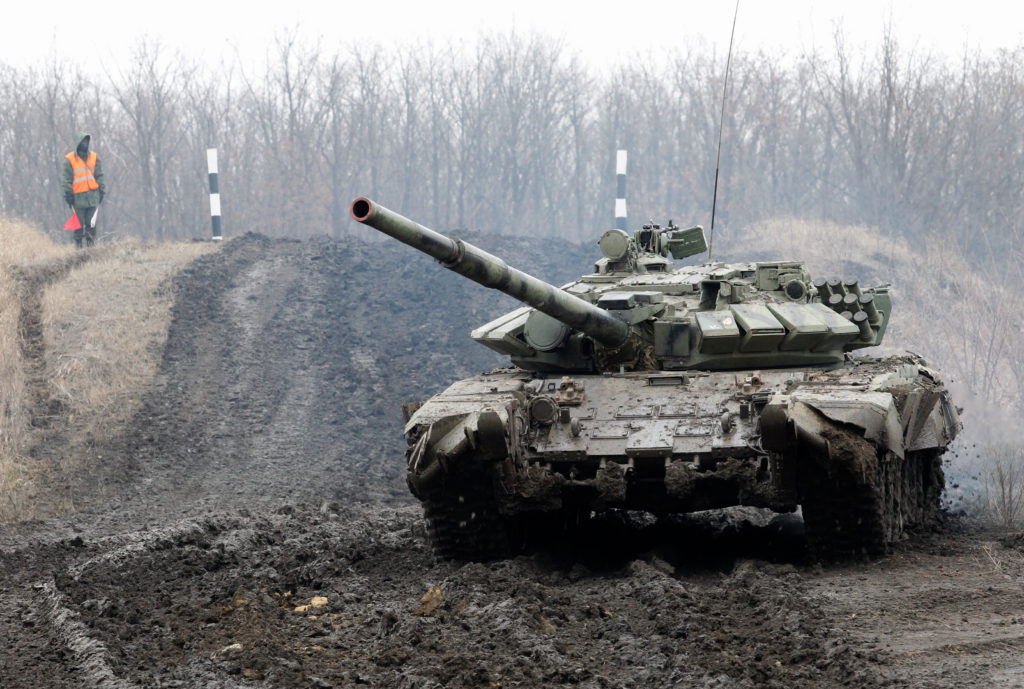By THE TRIBUNE staff
EU foreign ministers on Tuesday failed to come up with any concrete solution to the crisis involving a massive troop buildup by Russia along Ukraine’s border – an EU association state.
EU foreign policy chief Josep Borrell, speaking after a virtual meeting of bloc foreign ministers, sounded more alarms, and said the Russian troop presence had grown to 150,000 along Ukraine’s eastern frontier. Calling it the biggest military buildup ever near Ukraine’s borders, he added “a spark” was all that was needed to set off a major war.
But when asked if the EU – which has no armed forces at its disposal – individual member states have their own – had any plans for specific action to deter Moscow, Borrell said no – at least not now.
After a the virtual linkup of ministers, Borrell said that “for the time being, there is no move in the field of more sanctions”.
Though Kyiv and Ukrainian President Volodymyr Zelensky have been verbally soothed by assurances that the EU was behind the country diplomatically, not the EU, nor NATO, nor the U.S. or other allies have offered concrete military support.
The latest patting came last week when Zelensky was hosted by French President President Emmanuel Macron in Paris. German Chancellor Angela Merkel joined the virtual event. But aside from more reassurances of support, there was little in the way of specifics.
Some countries have sold limited amounts of military hardware to Ukraine, but also seem aware of the limitations of any covert – let alone overt – armed support.
Ukraine’s Donbass region – part of its eastern districts of Donetsk and Luhansk – have been controlled by pro-Moscow proxies since 2014. Kyiv has no control there, although no countries – not even Russia – recognise the patchwork statelets as “independent”.
Though Russian state TV broadcasts non-stop propaganda about alleged Ukrainian preparations for some sort of offensive against the “Russian-speaking” regions, few take this seriously while Ukraine has built a military virtually from scratch since 2014.
But few analysts or prognosticators want to be caught off guard, saying such a huge military buildup was impossible to ignore.
EU foreign policy chief Borrell did mention the latest in a slew of diplomatic expulsions between EU members and Russia.
On Saturday, the Czech Republic expelled 18 Russian diplomats. It says the Kremlin agents engineered two 2014 explosions at a Czech arms depot where weapons slated to be sent to Ukraine were stored.
The EU said it was in “full support and solidarity” with Prague over Czech claims that Russian military agents – tied to the 2018 Skripal poisoning in Great Britain – masterminded an explosion which killed two people at an arms depot.
Lead spokesman Peter Stano said the EU “is deeply concerned about the repeating negative pattern of dangerous malign behaviour by Russia in Europe. Russia must stop with these activities, which violates well-established international principles and norms and threaten stability in Europe.”
For his part, Ukrainian leader Zelensky has endorsed “quadrilateral” talks between Kyiv, Moscow, Berlin and Paris.
But the Kremlin has ignored Zelensky’s olive branch.
And the Kremlin has indicated it has bigger fish to fry.
U.S. President Joe Biden, while announcing new sanctions against Russia for alleged electoral meddling, has also been careful to point out that disagreements – and possibly solutions – go way beyond Ukraine.
“The way forward is through thoughtful dialogue and diplomatic process,” Biden said last week. “The U.S. is prepared to continue constructively to move through that process. My bottom line is this: where there’s an interest in the United States to work with Russia, we should.” Biden went on to propose a meeting with Putin to be held this summer.
Washington, tied up in heavy domestic issues, could thus pursue a dialogue dealing specifically with disarmament issues, among others.
Kremlin figures have expressed a strong interest in such a meeting.
To add to the complexity, the main issue affecting relations with Moscow and Kyiv is the construction of the “Nord Stream 2” gas pipeline which runs via the Baltic Sea to Germany. The line is 95 percent complete and once put into operation, it will become a real alternative to the transit of Russian gas through Ukraine. In addition to a major blow to Kyiv financially, it would free Moscow of any disinclination to be more brazen in Ukraine. Washington sees the Russian project as a lever to increase Europe’s energy dependence on Russia.

